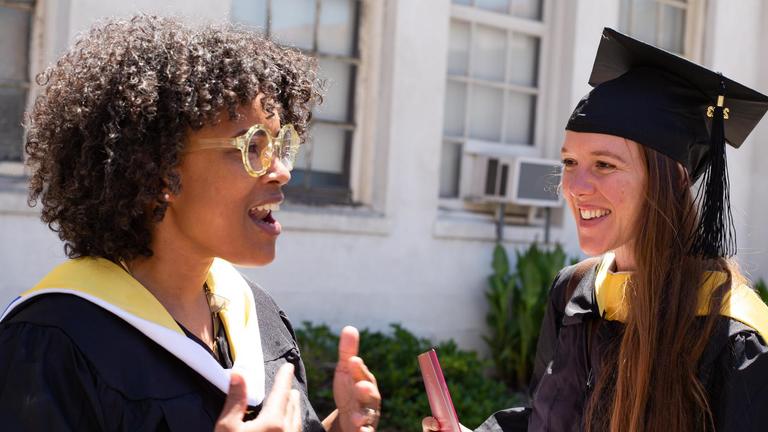What kind of jobs can I pursue with my M.S. degree?
-
Sex tech is a rapidly evolving industry that intersects technology, human sexuality and FemTech, creating various innovative products and services. A degree in SexTech equips you with a broad range of skills to pursue your professional interests that combine creativity, technology, and a focus on improving human sexuality, health, and relationships. Graduates will work with tech companies, startups, companies supporting women’s health, and similar sex tech companies in roles such as:
- Sexual Health Product Consultant: Provide expertise and advice for companies that design, develop, and market sexual health products and services.
- Industrial Designer: Focus on the physical design and user experience of sex toys and related medical devices and solutions. May work in the FemTech space, which usually focuses on developing solutions for female-bodied women.
- UX/UI Designer: Develop user-friendly interfaces for apps and devices, ensuring seamless user interactions.
- Research & Development Subject Matter Expert: Provide insights into human sexuality to inform product development.
- Sex Educators: Provide education and resources about sexual health and the use of sex tech products.
- Advocacy and Advisory: Promote sexual and reproductive wellness and the acceptance of sex tech and FemTech solutions in society and advise to support informed decision-making by leaders.
- Writers and Editors: Develop content for blogs, product descriptions, and educational materials.
-
A degree in sex counseling equips you to pursue several roles within the broader field of sexual health, education, and wellness, such as:
- Sexual Health Educator: Develop and implement educational programs and materials on sexual and reproductive health, relationships, and consent for schools, community organizations, non-profit, and healthcare settings. Lead workshops and seminars on topics such as sexual and reproductive health and wellness, intimacy, and communication skills.
- Sexual Wellness Coach: Provide coaching services focused on improving individuals' sexual wellness, intimacy, and relationship satisfaction (note that this role may require specific training or certification in coaching, depending on the region). This work can include the emergent role of intimacy coach/coordinator for the entertainment industry.
- Content Creator: Write articles, blogs, or create videos and podcasts on sexual and reproductive health and wellness topics for online platforms or magazines.
- Program Development: Develop and manage programs related to sexual health education, outreach, and advocacy for non-profits or healthcare organizations.
- Sexual Health Advocate: Work with advocacy groups to promote sexual health awareness, rights, and education within communities.
- Community Outreach Worker: Engage with various communities to provide information, resources, and support on sexual health issues.
- Peer Support Specialist: Offer peer support and guidance to individuals seeking help with sexual health concerns, often through non-profit organizations or support groups.
-
A degree in public health analysis with a focus on sexuality, reproduction, and health equips you with a specialized skill set ideal for various roles in public health, research, education, and advocacy. These roles typically leverage the analytical, research, and program management skills gained through a degree in public health analysis, along with a deep understanding of sexuality and reproductive health issues. Here are some potential job opportunities:
- Public Health Analyst: Analyze data and trends related to sexual and reproductive health to inform public health policies and programs. Evaluate the effectiveness of sexual and reproductive health interventions. Analyze large datasets related to sexual and reproductive health to identify trends, measure outcomes, and inform decision-making processes.
- Policy Analyst: Analyze and develop policies related to sexual and reproductive health, working with government agencies, think tanks, or advocacy groups.
- Administrative and Leadership in Sexual Health Organizations: Work in administrative, leadership, or similar support role within organizations that focus on sexual health, such as directing programs or initiatives, planning events, managing communications, or handling logistics.
- Program Coordinator/Manager: Oversee public health programs focused on sexual and reproductive health, ensuring they meet community needs and organizational goals. Manage funding, resources, and personnel involved in these programs.
- Researcher: Conduct research studies on sexual and reproductive health issues, publishing findings to advance knowledge in the field. Collaborate with academic institutions, government agencies, or non-profit organizations.
- Health Communications Specialist: Create and disseminate information about sexual and reproductive health through various media channels, aiming to educate the public and influence behavior.
- Advocacy Coordinator: Advocate for sexual and reproductive health rights, working with non-profit organizations, coalitions, and advocacy groups to influence public policy and public opinion.
- Consultant: Provide expertise to organizations and leaders on issues related to sexual and reproductive health, helping to design, implement, and evaluate programs and policies.
- Grant Writer/Fundraiser: Write grant proposals to secure funding for sexual and reproductive health projects and initiatives.
- International Health Specialist: Work on global health projects focusing on sexual and reproductive health issues, often with international organizations such as the WHO, UN, or international NGOs.
- Sexual Health Program Evaluator: Evaluate the impact and effectiveness of sexual health programs, providing recommendations for improvements and reporting outcomes to stakeholders.
What kind of jobs can I pursue with my Ph.D.?
-
The Ph.D. prepares students for a wide range of professional opportunities:
- Research: Conduct basic research, translational research, or applied research.
- Education: This includes K-12, higher education, and community education.
- Clinical and Counseling Mental Health: Work in a wide range of mental health support settings, including LGBTQ+ centers, community mental health clinics, and women’s centers.
- Advocacy and Policy Advising: Affect change widely by working on reproductive rights, pleasure activism, and more.
- Nonprofit Health Organizations: Bring positive change for women’s health, HIV/AIDs clinics, transgender health, and eating disorder clinics.
- Entrepreneurship and Startups: Work in research consulting or in starting SexTech or FemTech businesses.
- NGOs or Governmental Work: Work with organizations to including anti-trafficking efforts, health departments, and human rights organizations.
Students should note that while select courses integrate several core knowledge areas of the American Association of Sexuality Educators, Counselors, and Therapists (AASECT) to assist students seeking AASECT certification, the Ph.D. in Human Sexuality by itself does not lead to AASECT certification.
Our Alumni in Action
Get inspired by their stories.
A panel of notable alumni from the Ph.D. program discuss their change-making work and research.
Scholars in queer linguistics, language, and sexuality share about their experiences going to the Lavender Language conference.
The center helps LGBTQIA+ individuals and couples find culturally-competent, experienced therapists.




